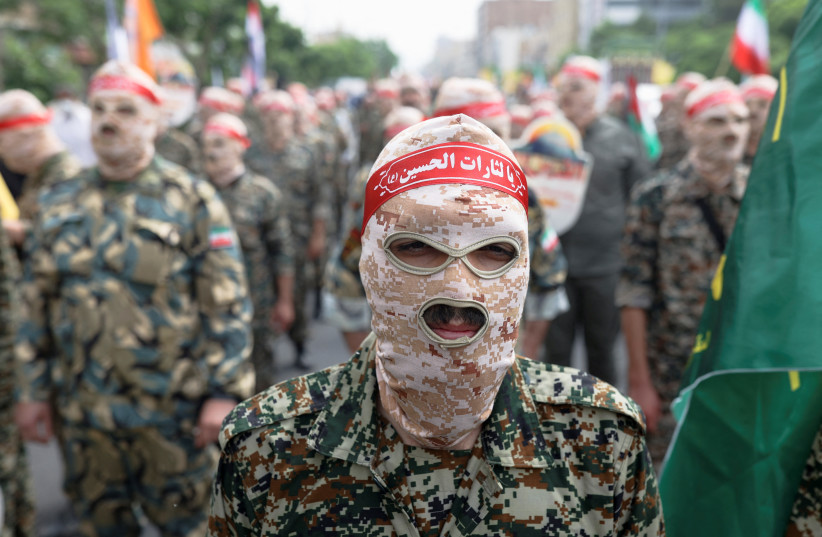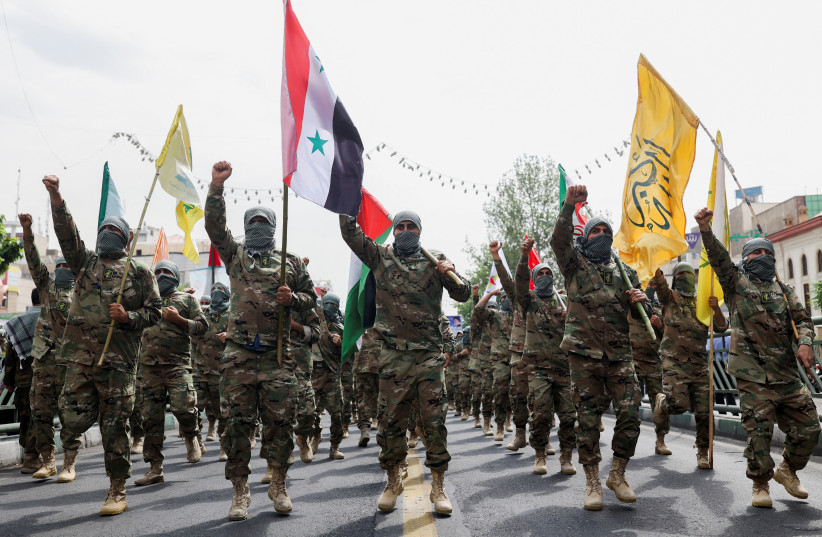German business deals with the Islamic Republic of Iran are booming amid the Iranian regime’s violent crackdown on protestors who are seeking the end of the theocratic state.
According to newly published statistics from the Federal Statistical Office of Germany, Germany exported €1.2 billion worth of goods to Iran from January to the end of October in 2022.
The federal republic imported roughly €260 million in merchandise from Iran.
The German-Iranian Chamber of Industry and Commerce boasted on its website that “Germany is still Iran’s largest trade partner in Europe.”
Germany exported €275 million worth of machines and engineering technology to Iran in 2021. Germany's non-transparent export regulations do not permit disclosure of the nature of the goods and material sold to Iran - some of which has been used for dual-use purposes (military and civilian aims) over the decades.

The Iranian-owned bank European-Iranian Trade Bank located in Hamburg and German banks (Volksbank Konstanz and Volksbank Schwarzwald-Donau-Neckar) situated in the southwestern German state of Baden-Württemberg provide transactions for sensitive business deals between German companies and Iranian banks.
The US accused the European-Iranian trade bank (EIH) of playing an illicit role in Iran's nuclear and missile programs. Germany continues to permit the EIH to operate.
Growing IRGC attacks on synagogues
Jason Brodsky, the policy director for the US-based United Against Nuclear Iran, told The Jerusalem Post: “ For far too long, Germany has offered a permissive environment for Tehran. It’s concerning that as German authorities are combatting IRGC [Iran's Islamic Revolutionary Guard Corps] arson attempts on synagogues, that Berlin is signaling it is open for business. Germany’s foreign minister has been repeatedly insisting that it cannot be business as usual with Iran’s regime while it is abusing its people.
"That will require changes in economic relations, especially closing Iranian-regime banks which have been operating on German soil to this day. These same banks resource Iran’s repressive apparatus.”
Kazem Moussavi, a German-Iranian dissident and spokesman for the Green Party of Iran, told The Jerusalem Post that "German business with Iran is controlled and directed by the Revolutionary Guard [IRGC]. With its profits, it [IRGC] finances state repression against defenseless protesters and supports terrorist forces such as Hezbollah, Hamas and Islamic Jihad who want to destroy Israel.”
"German business with Iran is controlled and directed by the Revolutionary Guard [IRGC]. With its profits, it [IRGC] finances state repression against defenseless protesters and supports terrorist forces such as Hezbollah, Hamas and Islamic Jihad who want to destroy Israel.”
Kazem Moussavi
Moussavi added “If the German government is serious about supporting the protests for women, life and freedom in Iran, it should stop all German companies doing business with the regime. A necessary guarantee for ending the Iran deals would be to put the Revolutionary Guard, which controls most of the economy in Iran and the mullahs' foreign trade, on Germany's terror list.”
The US government classified Iran’s Islamic Revolutionary Guard Corps a foreign terrorist entity.
The nationwide protests unfolding in Iran since September were sparked by the clerical regime's murder of the 22-year-old Iranian-Kurdish woman Mahsa Amini for failing to comply with Islamic dress code requiring a that she wear a hijab.
When asked about Germany’s flourishing business with Iran’s regime, Dr. Rafael Korenzecher , the German-Jewish publisher of the monthly Jewish newspaper Jüdische Rundschau (Jewish Review), told the Post “It's the money, stupid! First comes food, then comes morality.
It's about a lot of money. That is the one obvious motivation. Another reason is that both governments are brothers in spirit. One maintains the old axis of a left-wing political clique hostile to Israel.” Korenzecher called for a "stop of economic relations" between Germany and Iran. He wants sustained sanctions imposed on Iran and for Germany to withdraw from the Iran nuclear deal negotiations.
Sheina Vojoudi, an Iranian dissident in Germany, told the Post that "I would like to go back to 2020 first because it’s right after the 2019 ‘Bloody November’ which made a new era for the Iranian people to realize which countries exactly care about human rights. According to the German-Iranian Chamber of Industry and Commerce, Germany showed a significant positive trend in trade with the ruling Islamic regime in Iran in 2020, which was increased to over €1.8 billion."
Iran’s regime killed an estimated 1,500 protestors during demonstrations against the regime in November, 2019, according to a Reuters investigation.

Vojoudi, who is a spokesperson for the Senate of the National Iranian Congress , said “Germany should have ended all its trade with the ruling regime in Iran right after the Bloody November as the Islamic Republic’s largest trading partner in the EU. We need action from Germany. The Islamic Republic would be happy if the democracies only condemn its crimes without taking any action. The regime needs to keep its trading partnerships to survive, so to stop its killing machine, end your trade with one of the most brutal tyrannies in the world to defend humanity.”
Banafsheh Zand, an Iranian-American expert on the Islamic Republic, told the Post that “Germany's new administration has finally begun to talk tough, taking a clear stance against the now-unignorable brutality of the [Ali] Khomeinist regime.”
She continued that “However, there are also rumors that due to the Gas and oil shortage imposed on Europe by Putin, the Germans are, in fact, buying oil from Iran. That said, it's imperative that the German government investigate the shocking and abominable track record of corruption under Gerhard Schröder and his cronies, with Tehran's leaders.”
Schröder was a former social democratic chancellor of Germany who had cordial relations with Iran’s regime and is a supporter of Russian president Vladimir Putin.
In 2018, the Post reported that the German engineering company Krempl in Baden-Württemberg sold material to Iranian businessmen in Tehran for chemical missiles. Syria's regime used Iranian chemical rockets to poison Syrian civilians, including children.
The type of German technology sold to Iran for the production of chemical missiles could be used against Israel, argue experts. Baden-Württemberg is a hub of economic activity for Iran because of the high level of engineering companies in the state willing to do business with Iran.
Baden-Württemberg’s Green Party governor Winfried Kretschmann has declined to call for companies to cut ties with Iran's regime.
The human rights organization Simon Wiesenthal Center included Michael Blume, Baden-Württemberg’s controversial commissioner, who is tasked with combating antisemitism and hatred of Israel, on its list of top ten worst antisemites in 2021. Wiesenthal accused Blume, among reasons, for failing to to end pro-Iran regime activity in the city of Freiburg in Baden-Württemberg.
Freiburg has a dual city partnership with the Iranian city of Isfahan, which calls for the elimination of Israel and is a center for the development of the Islamic Republic’s nuclear weapons program.
The former American ambassador to Germany, Richard Grenell, played a key role in reducing German trade with Iran's regime, including pushing Berlin to ban Iran's alleged terrorism airline Mahan Air from German airports. Grenell also prevented Germany from allowing its bank system to send $300 million to Iran.
The Post sent press queries to Germany’s ambassador to Israel, Steffen Seibert, and the foreign ministry in Berlin.
